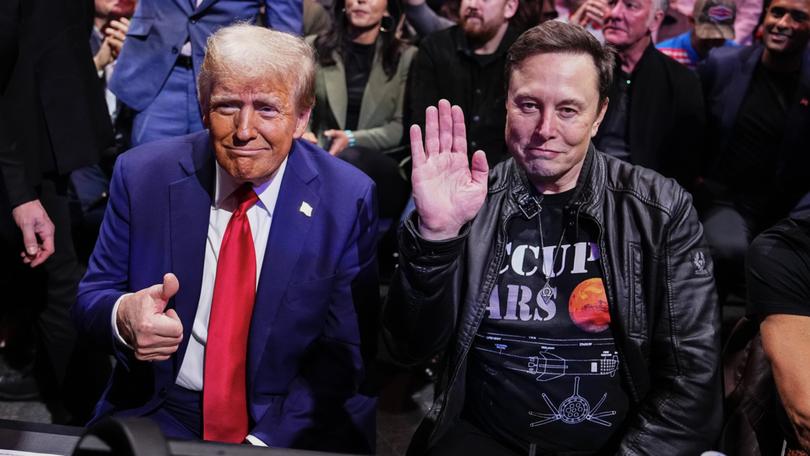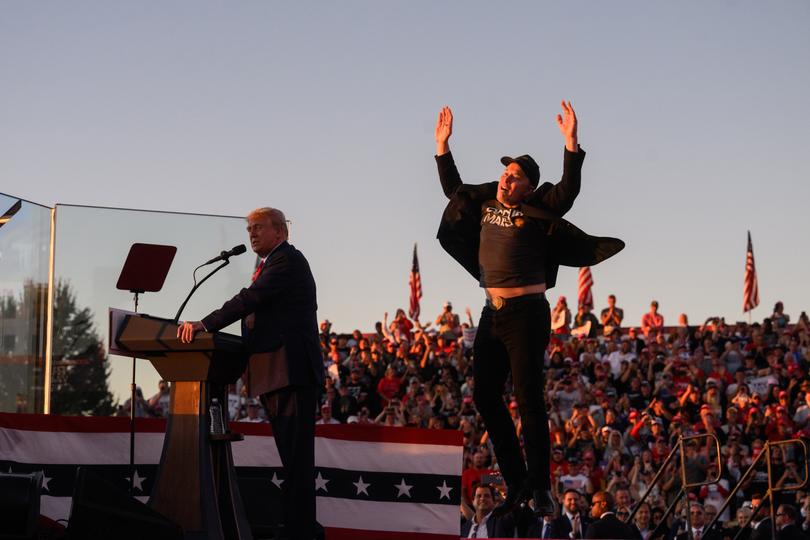THE ECONOMIST: The opportunities—and dangers—for Donald Trump’s disrupter-in-chief Elon Musk
Musk-led reform risks creating a new problem for America: the emergence of a combustible, corrupt oligarchy.

In Elon Musk branded Donald Trump a “con man” and “one of the world’s best bullshitters”.
Now he is known at Mar-a-Lago as Uncle Elon and is in the president-elect’s inner circle.
This week they watched a rocket launch together. The alliance of the world’s leading politician and its richest man creates a concentration of power both want to use to explosive effect: to slash bureaucracy, detonate liberal orthodoxies and deregulate in the name of growth.
Sign up to The Nightly's newsletters.
Get the first look at the digital newspaper, curated daily stories and breaking headlines delivered to your inbox.
By continuing you agree to our Terms and Privacy Policy.Mr Trump has a mandate for such disruption. Despite America’s economic prowess, much of Main Street, Wall Street and Silicon Valley is frustrated by Government profligacy and incompetence.
They are right to be. The state needs an overhaul. Yet Musk-led reform risks creating a new problem for America: the emergence of a combustible, corrupt oligarchy.
Weeks after helping Mr Trump win the election Mr Musk has climbed to the apex of power. The president-elect has appointed him to a new advisory body, called doge, tasked with slashing spending. Mr Musk is already in touch with foreign leaders and lobbying for cabinet appointments. It is hardly the first time a tycoon has had extraordinary influence in America. In the 19th century, robber barons such as John D Rockefeller dominated the economy.
In the early 20th century, when there was no Federal Reserve, John Pierpont Morgan acted as a one-man central bank.
Mr Musk’s firms are more global than the big 19th- and 20th-century monopolies, and smaller if measured by profits to GDP. Musk Inc is worth the equivalent of just 2 per cent of America’s stock market. Its main units are Tesla, an electric car firm; SpaceX, his satellite communications and rocket business; X, formerly Twitter; and xAI, an artificial intelligence start-up that was valued at $US50 billion in a deal this week.
These mostly have market shares below 30 per cent and face real competition. The Economist reckons that 10 per cent of Mr Musk’s $US360b personal fortune is derived from contracts and freebies from Uncle Sam, and 15 per cent from the Chinese market, with the rest split between domestic and international customers.
Mr Musk is also different because he is a disrupter. Rather than exploiting monopolies to raise prices, or creating a stable banking system as the foundation for finance, most of Musk Inc uses technology to slash costs in competitive markets.
This disruption is central to Mr Musk’s messianic ideology, in which innovation conquers humanity’s intractable challenges from climate change to colonising Mars.

Realising these distant goals depends on a genius for constantly rethinking industrial processes. His desire for freer action helps explain his contempt for orthodoxies, including what he regards as woke conformism. From the bureaucrats who allowed the American government’s space-launch market to be rigged by defence firms to the Californian box-tickers who regulate Tesla’s factories, he views the state as an impediment to growth.
Both Mr Trump and Mr Musk want to disrupt the entire Federal Government. Mr Musk has said DOGE may aim to cut as much as $2t from the $7t annual federal budget and abolish many agencies. It is easy to ridicule such goals as naive—$US2t is more than the Government’s entire discretionary spending. But with a budget deficit of 6 per cent of GDP and debt of almost 100 per cent, reform is needed.
The creaking Pentagon machine is struggling to adapt to the age of drones and AI. Lobbying by incumbent firms helps explain why federal regulations have reached 90,000 pages, near an all-time high. Even if Mr Musk achieved only a fraction of his liberalisation, America could have much to gain.
What, though, are the dangers? One is cronyism and graft.
The president-elect is an economic nationalist and the industries Mr Musk has interests in have become strategic, thanks to rivalry with China, the militarisation of space and cross-border disinformation wars.
Proximity to power could let him skew regulations and tariffs and hobble competitors in fields from cars and cryptocurrency to autonomous vehicles and AI. Since the start of September the total value of Musk Inc’s businesses has risen by 50 per cent to $US1.4t, far outperforming the market and its peers, as investors bet that its boss will be able to extract exceptional rents from his friendship with the president.
At the same time Mr Musk could bungle, especially when he is outside his areas of expertise. He has shown erratic judgment in foreign affairs, by micromanaging the use of the Starlink satellite service in Ukraine and comparing Taiwan’s status to Hawaii’s. His love of the limelight and conspiracies, and of the swirl of social media, are worrying. With $US50b of his personal wealth tied up in China, which hosts half of Tesla’s production, he is an obvious target for manipulation.
He could also fail before he even starts, because of the combustibility of the Trump-Musk combination.
The next president loves hiring and firing. The tech tycoon burns through executives and relationships, too. The fusion of Silicon Valley libertarianism and techno-utopianism with the maga nationalism of Mr Trump’s world is inherently volatile. Reforming government requires patience and diplomacy, neither of them Mr Musk’s strong suits.
If Mr Musk’s political career proves to be brief, it could still have two lasting, pernicious effects.
One would be to turn politicians away from reforming government. With his appointment, that goal has received more attention than ever. But if he mounts a half-baked programme that ends in spectacular failure, the ambition to tackle spending will be set back for years.
The other effect would be to normalise collusion between politicians and tycoons.

As the state expands into trade, industrial policy and technology, the incentives for state capture are growing. At the same time, Mr Trump’s method involves weakening institutions and practices supposed to guard against conflicts of interest.
America is a long way from behaving like an emerging market. But if oligarchic business titans habitually worked with dominant politicians, it would suffer great harm. That used to be unthinkable; no longer.
